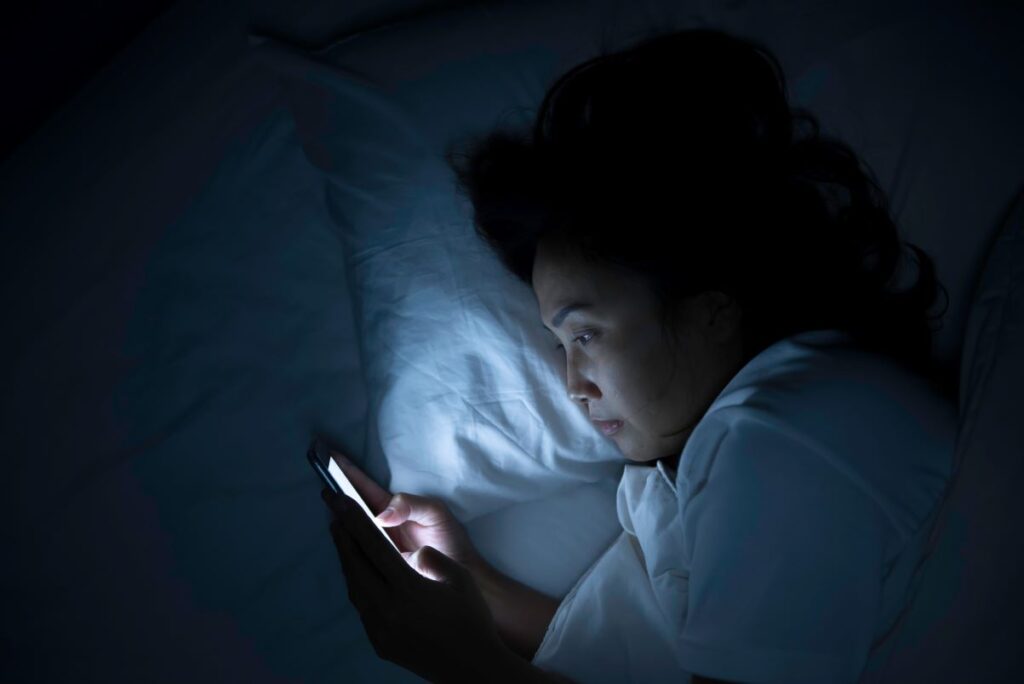
Picture this: it’s late in the evening, and you’re ready to go to bed. Unfortunately, you’re not feeling sleepy just yet, so you pick up your phone or tablet to peruse your favorite social media site for a few minutes until you start dozing. But for some reason, it doesn’t seem to help. Sound familiar? This is a common scenario for many people, but what they may not realize is that in an effort to make themselves feel drowsy by scrolling their electronic devices, they are actually doing the opposite. Worse yet, for those with sleep apnea, this kind of disruption isn’t just exhausting, it can be downright dangerous.
The Dangers of Blue Light
So, why does staring at a screen keep you awake instead of lulling you to sleep? It’s because of the blue light emitted from your device. Though synthetic, this light emulates the blue light we get from the sun. Now, during the day this is no problem. In fact, blue light is beneficial because it helps signal your body to stop producing melatonin and keeps you awake.
When the sun goes down, however, your melatonin production increases, giving your brain the thumbs up to fall asleep. But if you’re looking at a screen that omits blue light when your body should be producing melatonin, naturally you’re going to struggle to get some quality shut eye.
Blue Light and Sleep Apnea
When you have a sleep disorder like sleep apnea, struggling to stay asleep is par for the course. That’s because each night your body can experience numerous episodes (known as apneas) that cause you to stop breathing, wake briefly to restart breathing, and fall back asleep again. This cycle can then repeat itself often hundreds of times throughout the night. Worse still, even if you can fall asleep at a reasonable time and sleep for eight hours, you will not have quality sleep, and will likely still feel exhausted when you wake up the next morning. This can have a domino effect of chaos on your daily life, ranging from cognitive impairment like drowsy driving to stress, anxiety, and depression.
Now, factor in the added sleep challenges caused by decreased melatonin production from blue light, and you’re setting yourself up for a restless night.
How to Avoid Excess Blue Light Exposure
While it can be difficult to avoid blue light entirely these days, there are still ways to reduce your exposure even if putting the phone down is impossible. Here are a few suggestions:
- Purchase a pair of glasses with orange lenses to counteract blue light. Some clear prescription and non-prescription lenses also have blue light filtering capabilities, so inquire with your optometrist for more information.
- Turn off screened electronics for at least an hour before bed.
- Dim the lights in your home and close the curtains or blinds to keep outside light away.
- Work on a project such as a puzzle or read a book instead of picking up a device.
The Importance of Treating Sleep Apnea
In addition to reducing your exposure to blue light, it is also important to treat your sleep apnea. Sleep apnea can cause or contribute to a variety of dangerous medical conditions, including Alzheimer’s disease, stroke, high blood pressure, diabetes, and even some cancers. It can also increase your risk of sudden death.
If you have sleep apnea and have struggled in the past with CPAP therapy, an oral sleep appliance could help. These devices are custom fit to your mouth by your dentist, and reposition your jaw to open the airway without the use of forced air or uncomfortable masks.
It’s time to start getting the sleep you deserve. Stop relying on electronics to make you drowsy. Put down the device and speak to your dentist about treating your sleep apnea with an oral appliance today.
About Our Practice
The team at iSleepSolutions wants to help you find your own solution to a better night’s rest. Dr. West and Dr. Gorczyca are both skilled dentists with specialized training in both TMJ therapy and sleep disorders.
If you find yourself struggling to fall sleep each night or are waking up feeling tired and sluggish despite getting what you thought was an adequate amount of shut eye, schedule a consultation with us today. For appointments, please visit our website or call 702-602-2000.
